Epoxy Driveway (Pros and Cons & Designs)
In this epoxy driveway guide, you’ll see what it is, its pros and cons, its cost, how long it lasts, the best curing tips on concrete, and if it’s a good driveway option.
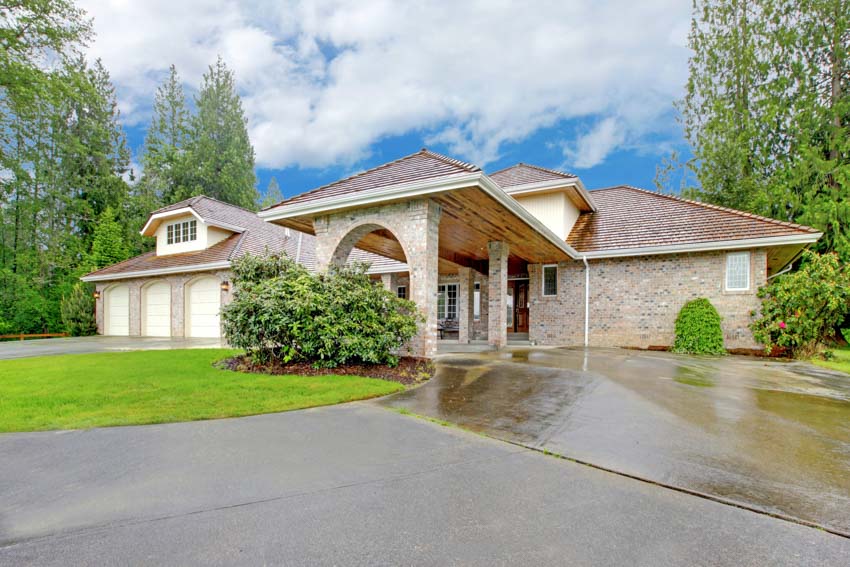
An epoxy driveway may not seem like the first thing that comes to mind as it may initially come off like something complex for average homeowners, but they can actually be quite simple. All it takes is a regular concrete driveway layered on with some epoxy coating.
This is a veritable upgrade compared to the regular concrete driveway that you’re probably used to, as it maintains all of the benefits of original concrete but has added features made available only to epoxy, such as impressive durability, a myriad of available finishes, and so much more.
If you want to dramatically improve the look of your driveway and boost its curb appeal, this coating is definitely the right way to go. Not only does it look good, but it’s also surprisingly easy to maintain an epoxy driveway.
What Is An Epoxy Coating
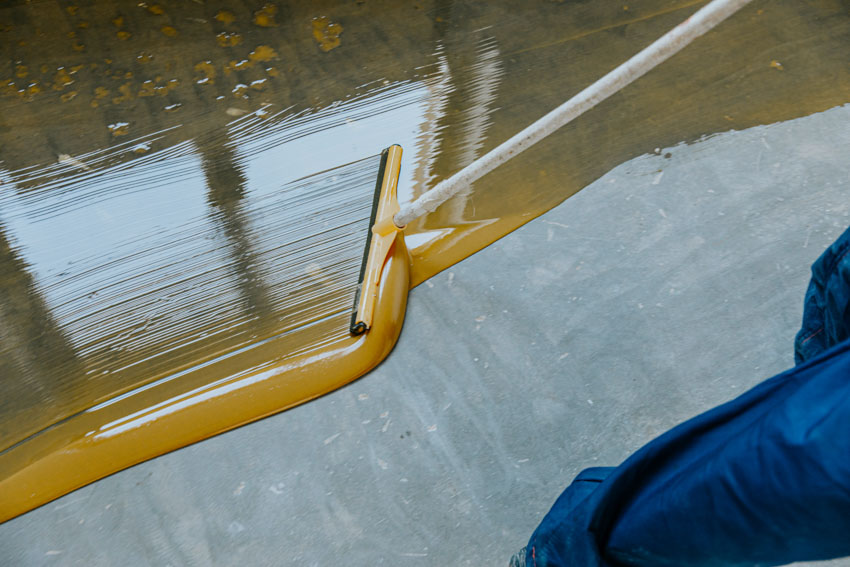
Let’s first break down what it’s all about. The epoxy coating used in your driveway is comprised of two parts: a polyamine hardener and an epoxy resin. They are being mixed together and this combination facilitates a chemical reaction that in turn, creates heat.
This is called an exothermic reaction. This heat is key to making it work as it makes the concrete surface bond well with the material. There’s also typically a top coat and a primer used alongside the mixture. Epoxy coatings on your driveway can be anywhere from 1mm to 5mm in thickness.
Some can be as thick as 1cm or even more. An epoxy driveway coating is not to be mistaken for epoxy paint. Epoxy paint may be stronger than regular paint, but it’s only 1% epoxy. It’s nothing compared to the durability and strength of the true material.
What you also need to understand is that the actual job of coating the driveway with epoxy is only as good as how you prep the concrete surface.
Before you can apply the epoxy coating, you first need to make sure that you have a concrete surface that’s clean, dry, and absolutely free from all forms of debris. If you’re overlaying on an old coating, you should first initiate a test patch to see how well the new finish is adhering to the old one.
Any holes or cracks on your concrete surfaces should be patched up. You need to understand that there’s a technique for the proper application of the finish on your driveway.
Sure, there may be epoxy installation kits that are DIY but a botched coating job on your driveway could result in you having to shell out a fortune to get it fixed. If you want to ensure that your epoxy driveway will last, you should be either skilled at it itself or if not, just opt out of it and get a professional to do the job for you.
Epoxy Driveway Pros And Cons
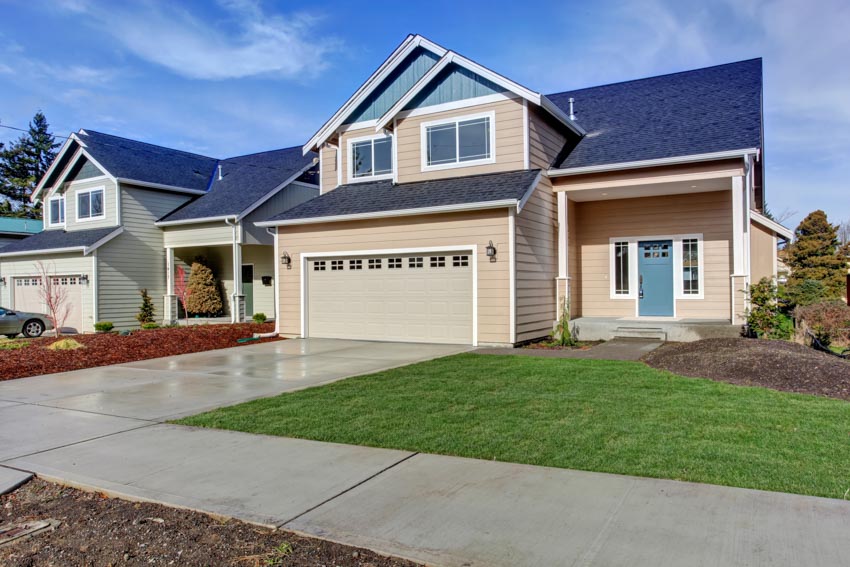
Here, we share the advantages and disadvantages of epoxy driveways.
Pros of Epoxy:
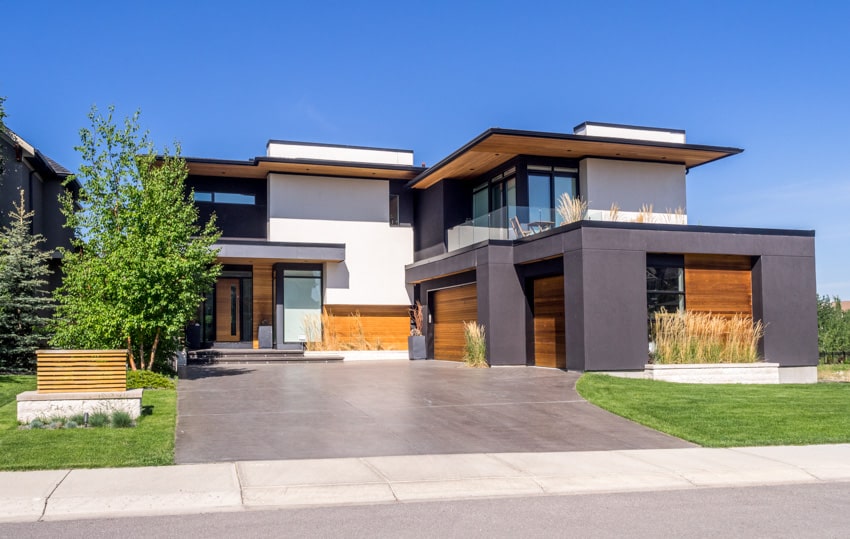
Economical: Epoxy is very cost-efficient per square foot. The installment also doesn’t require a drastic and total overhaul. It can be directly applied to existing concrete and reapplication costs are even less. It’s very bang-for-buck value for a driveway upgrade, for sure.
Can hold up against the weather: Epoxy can stand up to temperatures below 0 degrees and over 140 degrees Fahrenheit. Extreme temperature fluctuations can cause concrete to expand and shrink, eventually causing it to crack. This resin finish can be a protective barrier to avoid that.
Epoxy adheres to literally any surface you can think of: From garages to decks and patios, to walkways, or even other types of driveways; the coating can adhere to and stand up against literally anything and everything.
There are also additives to it that can keep the epoxy coating from being slippery when it’s wet. It can work with any surface setting and even more so with concrete, making it perfect for your driveway.
Extremely strong: This material doesn’t just look great; it is also extremely strong. This material can definitely stand up against lots of abuse. It can deal with leaking fluids such as oil and the like coming out of your vehicles, chemical spills, dropped tools, or even just the sheer weight of the vehicles themselves. This is not a problem at all for resin-based finishes.
It looks great: You actually get your hands on a lot of design options with resin-based sealants. You can go with a clear coat if you want to stick to gray, which is its mainstay color.
But there are also other designs to check out, such as mimicking the look of natural stone, pebbled finishes, solid colors, or even something with abstract designs if it’s something you fancy. With these options, you can have anything from a traditional to modern driveway design.
It also offers a lot of shine in its finishes and can hold up against wear and tear so this means that your driveway will keep looking new for years to come.
Low maintenance: This may just be the easiest flooring type ever to maintain. It won’t stain because it isn’t porous at all so vehicle fluids leaking out certainly won’t be an issue at all.
You also don’t need special cleaning materials for its maintenance. Some regular soap and water should be enough. From time to time, you will need the help of a mop, a spray hose, or a broom brush; but it really isn’t anything more than that.
Cons of Epoxy:
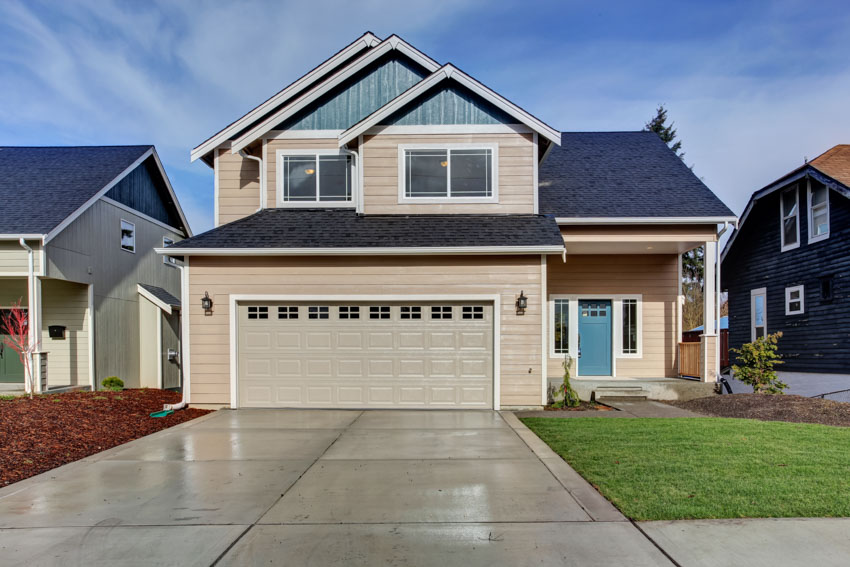
Underground moisture: This is also called moisture vapor as it rises from underground and then up to your epoxy coating surface, which is at the top of your concrete driveway. This moisture issue can lead to your coating delaminating. What this means is that if left unchecked, the finish might eventually separate from your concrete.
If you have a below-grade concrete slab as well as draining issues, this can be a problem but it really shouldn’t be otherwise, given the right settings required. The best sign to watch out for is a white powdery residue at the top layer even after cleaning. This is called efflorescence.
Potent fumes during application: During the installation process, applying a layer of pavement treatment on your concrete driveway could give off some strong fumes.
This can be an issue if you happen to be asthmatic or have any respiratory issues. It would be best to arrange to live somewhere else for the time being, just until the coating has fully cured.
Can be slippery when wet: Because epoxy is non-porous, this can, in turn become very slippery when it’s wet. This can be dangerous during rains and when children and the elderly are walking along the surface.
This can be mitigated with additives applied during the installation process. They can make your driveway surface non-slip so make sure that you discuss it with them.
Epoxy Finished Driveway Cost
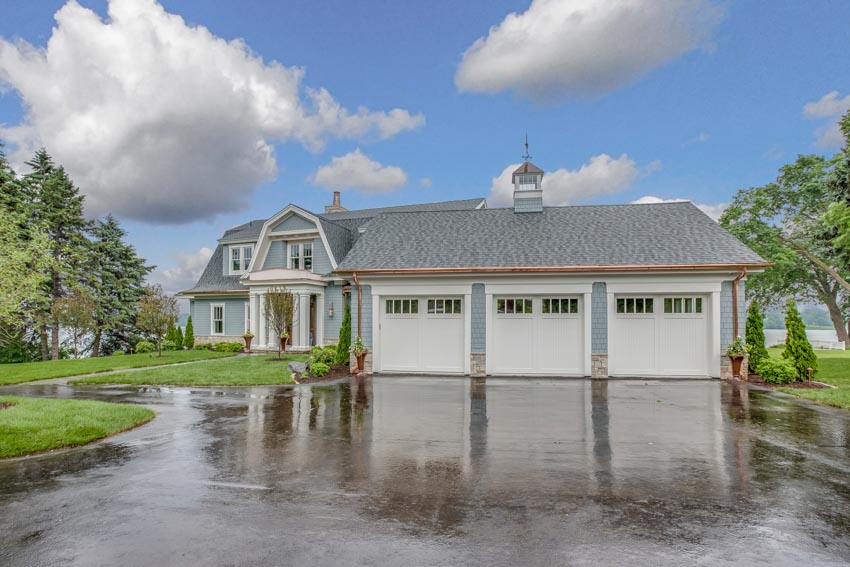
Here are some great ballpark figures to keep in mind when it comes to getting an epoxy driveway upgrade in your home:
• Materials: $2 to $5 per square foot
• Labor or professional fees: $1 to 7 per square foot
• Materials + labor: $3 to $12 per square foot
The application method can also weigh in on the application costs of your epoxy driveway. If you want to go for a decorative finish, there’s a special application process that might require a sprayer, a trowel, or even a squeegee. If this is the case, you might need to prep yourself to go beyond the $12 per square foot range.
Apart from this, there are other pre-installation checks that need to be done and they can be costly. You have to keep in mind though that opting out of them could lead to even costlier effects in the future.
• Structural engineer evaluation: $200 – $800
• Steel or concrete piers: $1000 to $3000 each (only in the event of damage)
• Geotechnical engineer’s soil report: $500 to $2500 (only in the event of damage)
• Foundation repair: $8000 to $30000 (only in the event of damage)
• Underpinning: $3500 to $6000 per corner (only in the event of damage)
• Epoxy sealers
1. Water-based: $30 to $50 per gallon – Cheap and easy to apply but is also the weakest type of sealer. You may need to reapply every 1 to 3 years.
2. Solvent-based: $45 range per gallon – Slightly stronger than water-based sealers but also more difficult to apply. This is more suitable for driveways located in areas with lower temperatures and healthier to work with.
3. 100% pure solid: $45 to $150 per gallon – The most durable sealer type but is also the most expensive. Resistant to scratches and heat. Requires professional installation. Recommended for areas with extreme temperatures and moisture levels.
How Long Does Epoxy Last Outside?
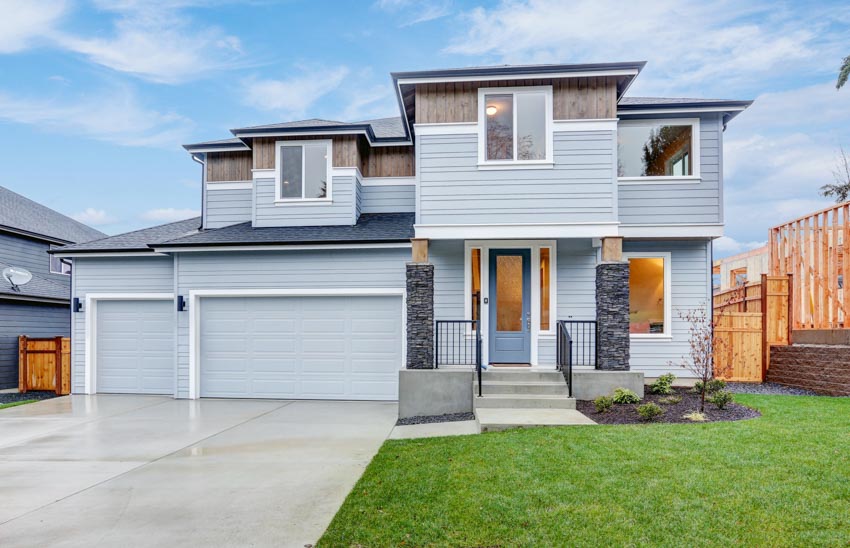
The average life span of an epoxy driveway coating can last for ten years or even much longer than that. It would be safe to say that if installed correctly, it can even last for decades or even a lifetime without cracking or without any signs of surface damage whatsoever.
If done professionally, a lot of installers will even offer extended lifetime warranties as well. This driveway coating is sure to last you for years and years to come so it really does make sense to think of it as a sensible investment.
How Long Does Epoxy Finish On Concrete Last?

A good average range for how epoxy adheres to concrete is around 10 to 20 years. However, this can stretch on even further with the proper maintenance and when touched up regularly.
This is one of the main benefits of getting a resin-based driveway. You not only get seamless flooring for your driveway, but it also adheres extremely well and becomes part of the main concrete layer once applied.
Is Epoxy Good For Driveways?
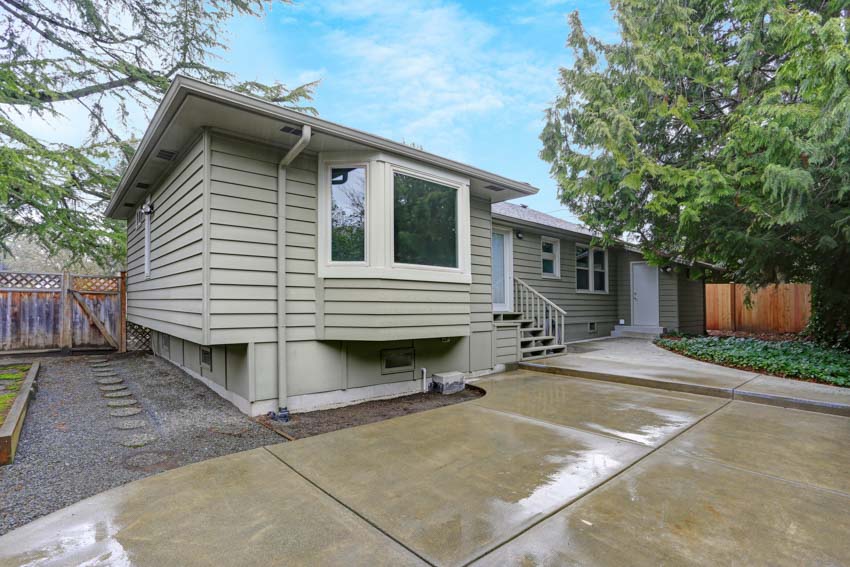
With the right concoction of additives, epoxy can be the perfect extra layer of coating for driveways. The fact that it’s non-porous means that it will stand up very well against the rain, snow, heat, or whatever else the elements may bring.
Are Driveways Coated In Epoxy Slippery?

Yes, they can be on their own. Thankfully, there’s a practical solution to this, as slippery driveways can be a real safety hazard. The right additives will also ensure that the epoxy coating is turned into something that’s non-slip.
Make sure that you keep this in mind as without the proper additives mixed in during the installation process, your driveway with an epoxy floor can be very smooth and can be slippery like ice at the slightest contact of moisture such as rain or snow.
How Long Does Concrete Need To Cure Before Applying Epoxy?
45 days. If you have a normal concrete mixture, you need to wait it out for at least 28 days before you apply your epoxy coating. However, you need to keep in mind that there can be weather conditions that might impede the actual curing process so we really recommend waiting it out for up to 45 days.
You can opt for faster curing concrete types if you happen to be in a hurry but for regular concrete, this is the recommended timeline. Discuss it with your driveway installers if you want to work with an accelerated timeline. There are actually lots of upgraded formulas for new concrete that don’t take up as much time to cure.
You just need to make sure that this is sorted out accordingly, with the people pouring your concrete for the driveway and installing the coating application.
Most companies offer the two services but in the event that you’re hiring different people for the two jobs, at least make sure that they consult with each other accordingly.
How Do You Know If Concrete Is Ready For Epoxy Sealent?

There are a lot of things to consider before sealing concrete driveways with an epoxy coating. And we’ll break them down for you below. These elements should be missing from your concrete’s appearance:
• Moisture: Make sure the concrete has reached its max timeline for curing. Things to watch out for are dark spots and efflorescence (white powdery stuff coming up through the surface). This can be an indicator that there’s moisture from down below the surface wicking up.
• Laitance: Laitance is the layer of concrete that appears very weak or brittle. An appearance of laitance could mean that:
1. The concrete was overmanipulated during the application process
2. The water-to-cement ratio was too high
3. The curing process may have been interrupted by a freeze-thaw cycle from the outdoors
4. The concrete has become too fragile
• Immediate darkening upon contact with moisture: The easiest way for you to determine if the concrete is ready is if it will readily absorb water. If takes a moment or longer for the water to absorb, this may be a sign that your concrete isn’t ready yet.
See more related content in our article about sealing asphalt driveways pros and cons on this page.


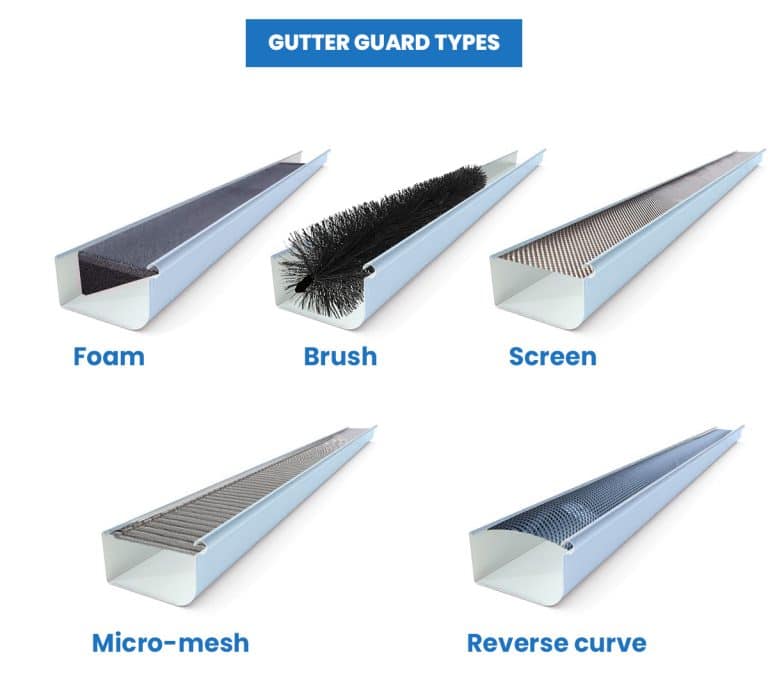
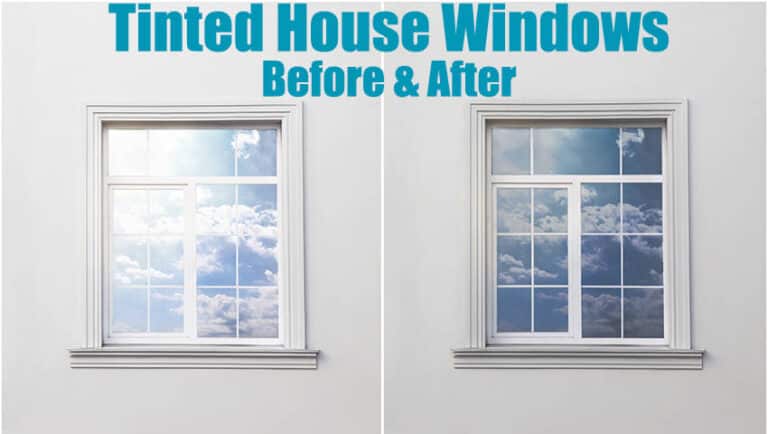
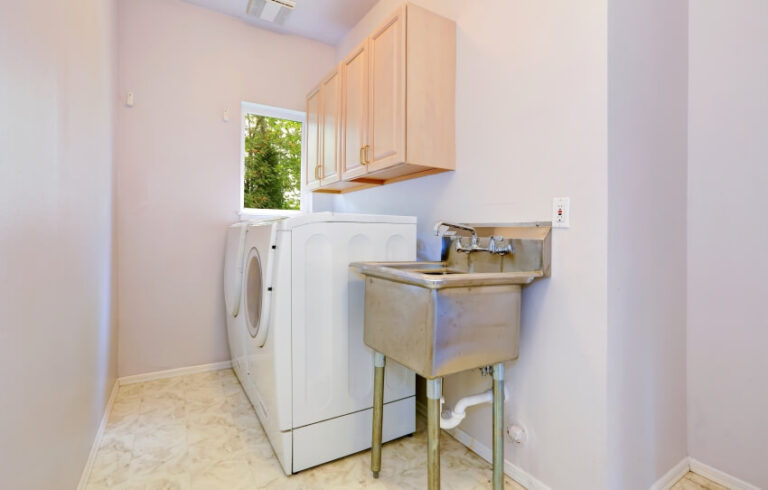
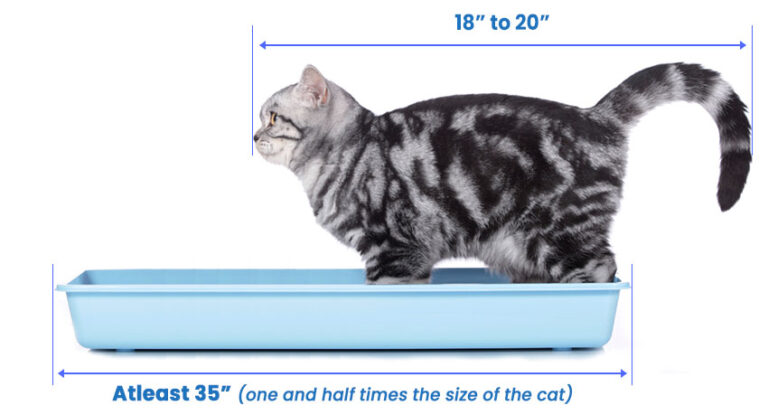

Can epoxy be applied in the cold weather
Most epoxy won’t cure below 50 degrees in temperature unless the product is specially formulated for cold weather. Thank you for the question.
I just had my driveway done with epoxy on top of my concrete driveway. I did go light but why can I not get tire marks off with soap? And all little leaf stains?
You may need to use an epoxy degreaser for tire marks and a mild bleach solution for leaf stains. But before you do that I’d try reaching out to whoever did the work to see what they recommend. Thanks for the question.